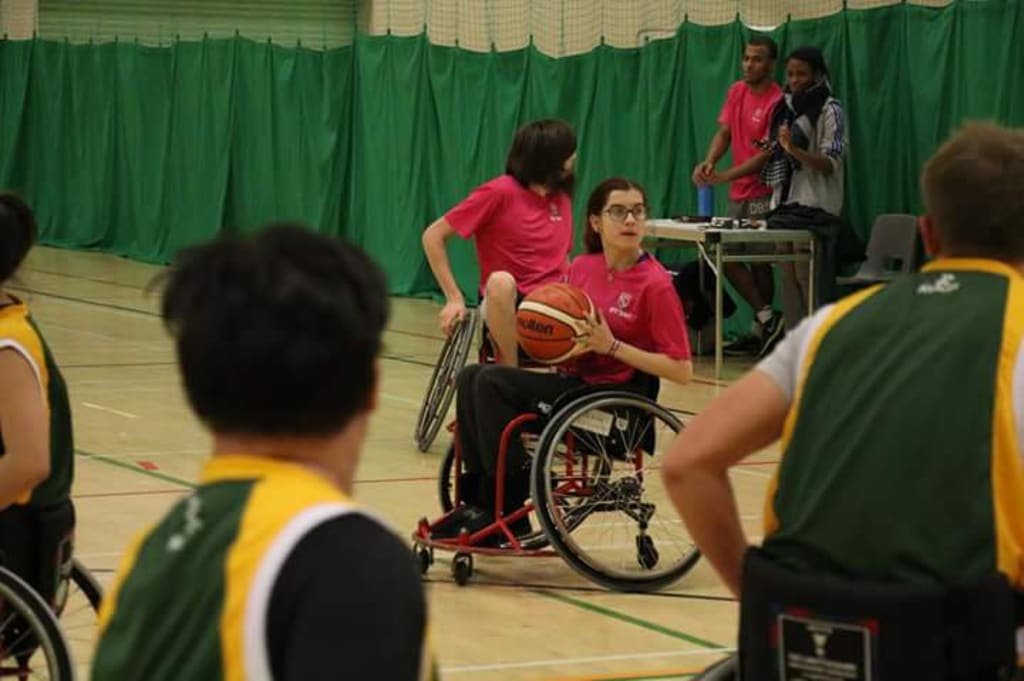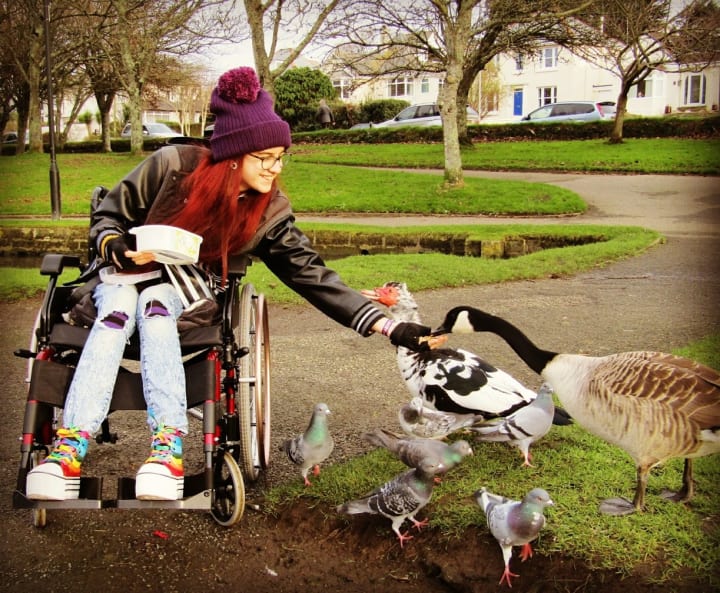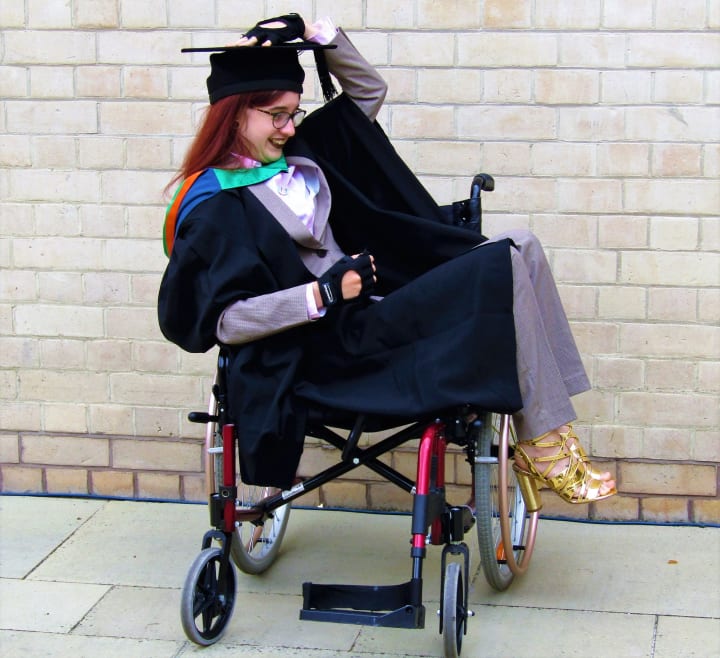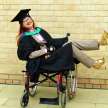How I Went to University with Chronic Illnesses
Did fibromyalgia and cold urticaria impact my studies?

While applying to university, I wasn’t considered disabled, but looking back on it with the knowledge I have now, I should have been. Regardless of this, in my applications, I disclosed my health conditions, as well as the undiagnosed chronic pain issues that we now know to have been caused my fibromyalgia. At the time, I had diagnoses of depression, anxiety, and cold urticaria, and undiagnosed chronic pain, which had some possible diagnoses but nothing concrete. Without a formal diagnosis, it was difficult to do anything with that and have an acknowledgement of the struggles I was facing, and the support I would need.
Acceptance

This photo was taken immediately after my first phone call from the university's disability team. Their openness and willingness to help put me in such high hopes that I had to snap a photo.
Once I got accepted to my university, prior to attending I received a phone call from the disability support staff from student support services. During this call, we discussed the health conditions I had and the support that would be put into place for me upon attendance. We discussed access to the laboratories on campus, including seating possibilities, mobility aids, and contamination protocol. We discussed how depression and anxiety would come into play and affect my studies. He asked if anything had changed in regards to my pain, which it hadn’t, and whether I’d received a diagnosis yet, which I also hadn’t. This was in part due to being in Cornwall with questionable health services, and also due to being a student at a busy time in my life, trying to push health concerns to the back of my mind. Cold urticaria was largely ignored, because neither of us really knew how much it would affect my studies.
First Year

Shockingly, the temperature north of Cornwall was so much warmer that I could quite safely go outside without a coat on! (Photo Credit: Hennie Swan 2015)
I’d moved north from Cornwall and was shocked to find the city temperature to be warmer than in my small coastal town. I enjoyed wearing a cropped top outside in September, without having to put layers and layers on over the top. It was such a novelty. My antihistamine and cold urticaria management was working really well, so at this point, CU management was largely not a problem. I’d only have issues with ice in my drinks, anything frozen, and snow.
Chronic pain however, became worse and worse, and my attendance suffered. I have vivid memories of lying in my bed wrecked with guilt at missing a day’s lectures, but the pain in my ribs was so bad that breathing had to be shallow to avoid the fire of full lungs. It wasn’t until I spoke to a friend of mine with mental health conditions that I realised I was entitled to more help and accommodations for my health conditions, diagnosed or not. After getting in touch with disability support staff, accommodations were put in place to ensure that I wouldn’t be penalised for being late to lectures due to the effect of pain on my mobility, anxiety, or depression. I wouldn’t be penalised for missing non-assessed labs due to any of my health conditions. I would get extra time in exams as well as stop the clock breaks so I could medicate and rest my achy arthritic hands. I would also sit my exams in a much smaller room with fewer people in it, which allowed it to be heated better, which was the first recognition I had for my cold urticaria.
Socially, I made great friends and got involved with extra-curricular activities as much as I could, but my health definitely held me back somewhat. My friends would, even if they didn’t understand what was going on with my health, would do their best to help me out, or tell jokes to end the awkward for the benefit of all of us. They’d catch me up on all the work I missed due to my pain, and we revised together to find methods of learning that my brain fog couldn’t take from me.
Second Year

The world's guiltiest shoulder, shrouding all my second year memories in pain and misery just to be dramatic.
Due to the cognitive impairment that Fibromyalgia (https://www.youtube.com/watch?v=9ucgZYbayvo) brings to the table, I don’t remember much of it, and the parts that I do remember are drowned in pain.
I struggled with severe pain in my right shoulder. The pain was so bad that I couldn’t actually carry my bag around campus. I’m so fortunate to have had an amazing friend that without even asking stepped in and carried it for me. And he did it all without making it weird. That was the norm in my friendship group, that I would struggle, and they would all help if they could. It would have been weird if I hadn’t needed help.
I finally got to see a rheumatologist, that despite minimising my pain and belittling me, was forced to eat humble pie when my scans showed massive amounts on inflammation all around my body where he was adamant there wouldn’t be anything except hysteria and hypochondria. With these scans, and physical proof of my pain, the university finally listened to me properly, and put in place the accommodations that I had needed from day one. I received helpful equipment: a Dictaphone, voice to text software, and transcription software so I could get the same notes from lectures that healthy students did. I felt so much less guilty for just sitting and listening because my hands hurt too much to write. I could give my dictaphone to friends, who would then record the lectures for me so I could catch up at home if the content wasn’t on the website, or the content was very basic.
With that guilt managed, I was able to do extra-curricular activities. I put more of my time into societies and society events, and that year I successfully ran in the student unions election and because their equality and diversity officer for gender to stand up for transgender students and our rights and our accessibility.
But what about cold urticaria?

I was not willing to give up ice cream just yet.
My antihistamine regime was still working but it was starting to wane. My airways would become more reactive, especially if the air temperature was below five degrees Celsius or there was wind chill. I could use an inhaler at this point, which would help, but it would still be a struggle. That didn't stop me from eating ice cream though!
Third Year

The wheelchair marked the start of a tough period in my life. But without it, it would have been so much worse.
The year started at the start of October and by the end of November, I was reliant on my wheelchair to leave the house, get to university, and get around campus. A lot of my friends went on an industrial placement year so, they were all over the world. Without them, the isolation was a real struggle. But through my role as the E+D officer for Gender, I made connections with the university’s wheelchair basketball team, and eventually joined the club as a player. Training in the cold sports hall really kicked my cold urticaria off, and I would wheeze like you wouldn’t believe. I could no longer use my inhaler as I was put on beta blockers after illness over the summer.
Academically, within the labs, the work we were doing required me to handle ice, and handle things that have been on ice. I didn’t have so much of a problem with the urticaria side of things per se, but my hands would swell and the itch felt as though it was down to my bones, all despite my antihistamines. I just accepted it as part of my life, which was silly looking back, because my recent switch to Fexofenadine has been life changing.
Graduation with a BSc (hons) in Pharmacology

Wheelchair perks: You can wear whatever heels you want with no ramifications.
With the pain and allergies, my attendance sucked. But I caught up, made it work, and graduated with a 2:1 BSc (hons) in Pharmacology, in my wheelchair. And with this grade, I was accepted on to an MRes course at the same university.
Postgraduate Research

Working hard, or hardly working? Just kidding, I was trying to make the stats work.
I began the year still using my wheelchair, and because of this, my attendance in the first term was great. I worked really hard to show up because not only was there a lot to learn, I was passionate about every single thing we were taught. But my pain grew passively. The campus wasn’t very accessible, and the rooms they were using for our lectures were poorly thought out for disabled access. Being with a whole new group of people who hadn’t known me prior to using a wheelchair thus didn’t just know me as “Max but sat down” but instead knew me as “The one in the wheelchair,” I felt weird about asking anybody for help getting around. This was on me, not on them, I made some wonderful friends in there and they were all great people, but being around strangers when you’re disabled is challenging.
Then, after the first term, the temperature dropped.
Most of January through March, I was housebound, being depressed, anxious, itchy, and in pain. The problem with the cold for manual wheelchair users in particular, is that the metal push rims often freeze, and if there is snow or grit on the ground, that increases the resistance and thus makes it harder to propel the wheelchair. Similar problems are faced by electric wheelchair users, as well as problems unique to them. I kept up with lectures from home, but it was a struggle as a lot of the content wasn’t made accessible to me, with only some lecturers posting their content on the university website, and only half of the ones that did had useable lecture notes. But I did my best.
Then, one snow day, I rebelled. I took to my back garden with my housemates to partake in a Calendar Girls-esque photoshoot, leaving my body with lots of skin exposed to snow and freezing air temperatures. I was feeling so down about having to miss out on my passions that I tried to show my chronic illnesses who’s boss, but in doing so triggered my first systemic allergic reaction to the cold, as well as the decline of my cold urticaria management. Now I wheezed almost every time I went outside, and my skin would itch even if there was no urticarial rash present.
Moreover, my chronic pain increased even more. I decided that I can’t just accept this as my life, and booked in to see a new doctor. She trawled through my complex medical notes to actually give me a definitive answer of what was causing my pain. Up until this point it had been largely speculation, with hesitance to actually do something about it or run further tests, or even diagnose me with anything because of my age, gender, etc. with my symptoms often being put down to anxiety. Despite not identifying as a woman, I often get put in that box, and then experience the trials and tribulations of being a woman with chronic illness.
She confirmed that I do in fact have Fibromyalgia, and after 10 years of being given nothing but Ibuprofen (which I am also allergic to), it was time to start treating it as such. She prescribed me amitriptyline. This drug turned me into a zombie when I first started it, but on the morning of day three, I woke up and took a pain free breath.
Don’t get me wrong, I was still in pain, breathing still hurt, and it still hurts now. But until then, every first breath of the day hit me like a truck. But this one hit me like a feather with birds singing in the background.
My attendance was still low for a while as I adjusted to the drug and waited for the temperature to warm up as we came into spring. And as that happened, if I woke up feeling unwell or it was a very cold day, I wouldn’t have to miss the entire day. I could miss the first lecture, but show up for the second, third, fourth, fifth, and sixth.
Graduating with MRes in Pharmacology with Commendation

I may have missed the ceremony, but I didn't miss the snacks.
It wasn’t until September that I realised how helpful vogmasks could be for cold urticaria, and if I had them, they would have changed my life and maybe things would have been different. But despite all this, after successfully completing my research, I presented it, and graduated with a Masters by Research with a Commendation in Pharmacology in December 2018.
Overall, studying at university with chronic illnesses is incredibly tough, but it can be done. There are a multitude of things that can be done to support you and help relieve the extra challenges bought to the table by your chronic illnesses. And despite all this, there is no shame in not finishing for whatever reason. It’s OK. Universities currently are largely inaccessible, and the institution as a whole needs to do better with disability inclusion. This could be in the form of making every single building independently wheelchair accessible, braille signs across buildings and campuses, hearing loops and sign language interpreters on site at all times, better funding into disability inclusion in their sports centres and teams, encouraging societies to learn about their accessibility and make their events accessible to their disabled members.
Hopefully, the only way is up.
About the Creator
Max Fisher
Max is a disability and trans rights activist from Nottingham. They are non-binary, and they live with chronic pain, using a wheelchair part-time. They are a passionate scientist. Instagram: @Ouch_mouse | Twitter: @OuchMouse8






Comments
There are no comments for this story
Be the first to respond and start the conversation.